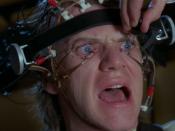The new American edition of the novel A Clockwork Orange features a final chapter that was omitted from the original American edition against the author's preference. Anthony Burgess, the novel's author, provided for the new edition an introduction to explain not only the significance of the twenty-first chapter but also the purpose of the entire book which was the fundamental importance of moral choice. Burgess states that the twenty-first chapter was intended to show the maturation or moral progress of the youthful protagonist, Alex. The omission of the twenty-first chapter resulted, according to Burgess, in the reduction of the novel from fiction to fable, something untrue to life. Human beings change, and Burgess wanted his protagonist to mature rather than stay in adolescent aggression. The twenty-first chapter shows this change, and the chapter is important because it includes Alex's mature assessment of his own adolescence and shows the importance of maturity to moral freedom which is Burgess's main point.
Burgess has presented his definition of moral freedom in both his introduction and in his novel. This definition will be discussed and it will be shown how Burgess relates it to three kinds of clockwork oranges.
Burgess's definition of moral freedom as the ability to perform both good and evil is presented by implication in his discussion of the first kind of clockwork orange. In his introduction, he states that if one "can only perform good or only perform evil, then he is a clockwork orange - meaning that he has the appearance of an organism lovely with colour and juice but is in fact only a clockwork toy to be wound up by God or the Devil or (since this is increasingly replacing both) the Almighty State." Burgess goes on to say, "It is as inhuman to be totally...


